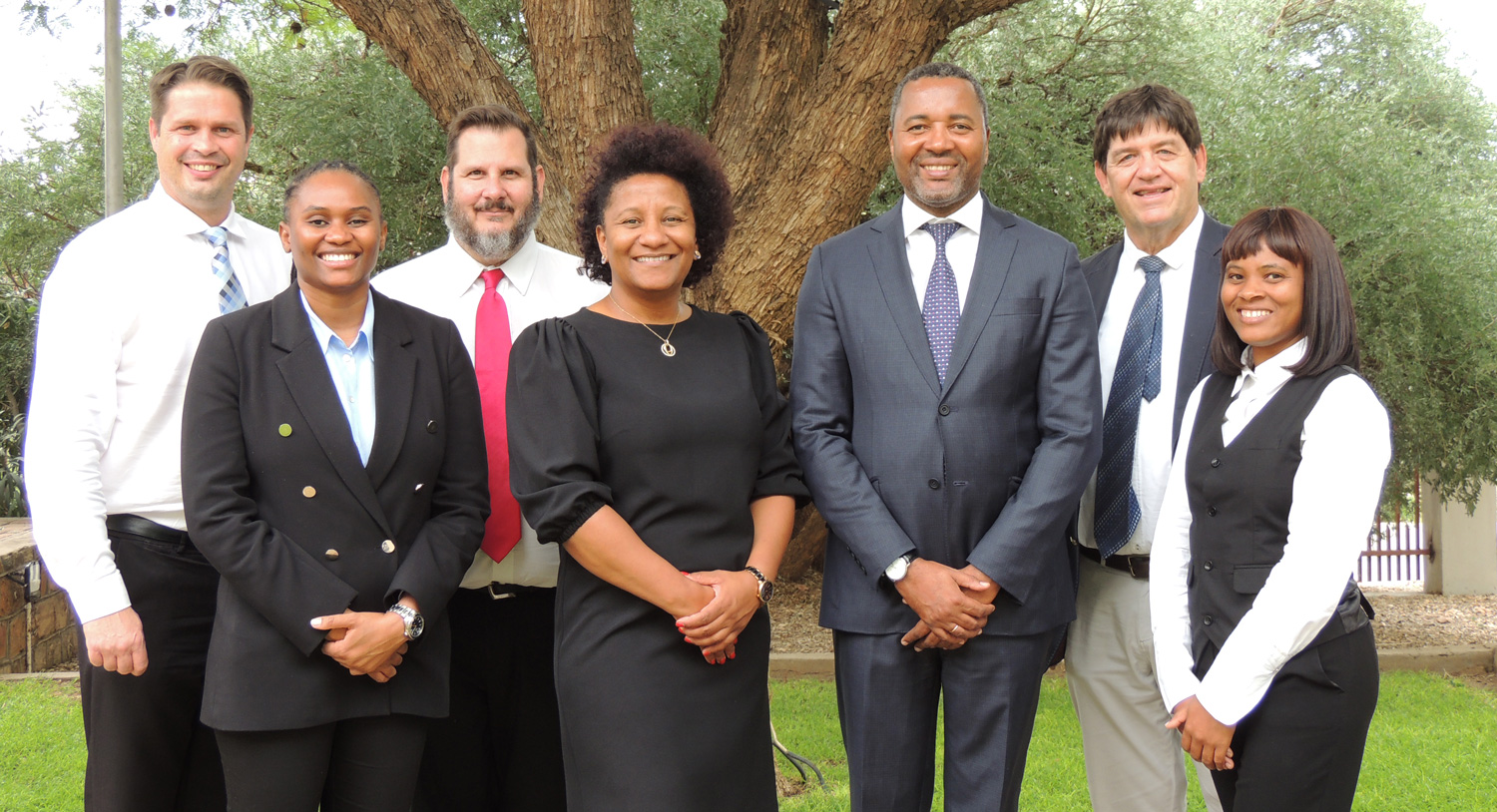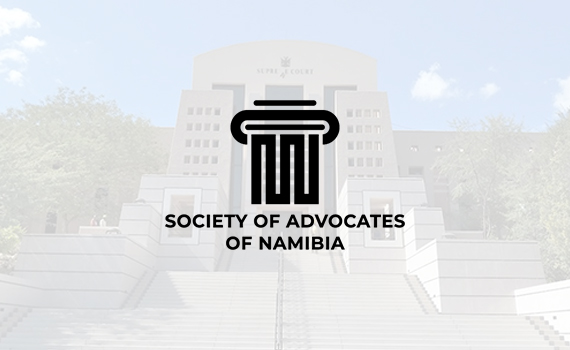A SHORT HISTORY OF THE BAR
The Society of Advocates of South West Africa adopted its first constitution on 3 August 1993. In 1986 the Society changed its name from Society of Advocates of South West Africa to the Society of Advocates of Namibia – 4 years before Namibia became independent. In terms of this Constitution the Bar Council is the Society's executive body which consists of the President, Vice President, Secretary General, Treasurer and one additional member, all of whom are elected by members of the Society at its Annual General Meeting. The Bar Council meets from time to time.
The Namibian Bar, however, existed for much longer, although it did not have a constitution and all members of the Bar attended all meetings which were called by the President thereof, whenever required.
On 26 January 1920 three practicing advocates constituted a body called the Bar Council of South West Africa. The only documentation that exists of the earlier activities of this Bar Council are the Minutes of Bar Council meetings. It appears from these Minutes, which were handwritten, that one of the members of the Bar chaired the Bar Council meetings. Later an honorary secretary was elected who kept the Minutes. The first member who chaired Bar Council meetings was Adv. L.O.P. Pymont and when the Bar Council was founded there were two additional members namely L. Ward and I Goldblatt. Goldblatt became the first elected President of the Bar Council on 14 July 1942 and J.P. Niehaus the honorary secretary.
The Bar Council initially concerned itself with matters such as the non-payment of fees by attorneys and disciplinary proceedings against a member who apparently appeared without being briefed. The membership of the Bar Council grew and also included the attorney-general and his staff. According to the Minutes of the Bar Council there were some years during which no Bar Council meeting was held.
It seems that one of the matters that received much attention was the appointment of South Africans on the High Court bench, which bench consisted during the earlier years of only one judge. The Bar Council often opposed the appointment of a judge and even solicited the support of the Law Society or Side-bar, as it was called, and on occasion even went to Pretoria to confront the South African Minister of Justice. All these efforts were to no avail and retired civil servants with minimal practical judicial experience were continuously appointed to the South West African bench. A member of the Bar Council during 1921, F. (Toon) van den Heever, was the honourary secretary but disappeared. Later he was appointed to the Bench as a legal advisor of the South African Government. The Bar and Side-bar objected, but again to no avail. Toon van den Heever lateron became a well known Appeal Court Judge in Bloemfontein. During 1947 the Bar Council in conjunction with the Side-bar was again unsuccessful in its opposition to the appointment of a retired legal advisor from South Africa, Judge Brebner. The Bar Council resolved on 22 March 1947 that its members shall not accept any Pro-Deo defences and would not sit as assessors in criminal cases. This situation continued for more than 4 years until the Bar Council, at the request of the same judge Brebner, decided to end it boycot. These unsuccessful attempts to have persons from the local Bar appointed on the local Bench in stead of South Africans continued and even on 8 October 1979 two members of the Bar, C.J. Mouton SC and L.C. Muller, met in Pretoria with the Minister of Justice in this regard. Again it did not help. The Bar Council issued a press statement in this regard. Only after the High Court of South West Africa was established through legislation and was no longer a division of South Africa, local members of the Bar were appointed as judges. The first of these appointments was Adv. G.J.C. Strydom S.C., who is presently the Chief Justice of Namibia. Until 21 March 1990 when Namibia became independent, all appeals from the High Court were heard by the Appeal Court in Bloemfontein. There were also very competent lawyers appointed to the local bench. Both judges Buddy Muller and Gus Hoexter became Appeal Court Judges.
The Bar Council had to cope with an unusual problem during the second world war. Nearly half of its members joined the allied forces and a decision was passed that the remaining members would appear on behalf of those members who joined the war for half of their fees in unopposed matters. The other half was paid to the particular member who joined the war effort.
The Bar Council had never any prohibition against the joining of any member on racial grounds. On the contrary, the Society took a strong position during the liberation struggle of Namibia against what it considered as injustice committed by members of the South African Defence Force and the Police, in particular under so-called anti-terrorism legislation. The Society even persuaded the Administrator-General to appoint a Commission of Enquiry into atrocities committed by these forces, the van Dyk Commission. As member of the Society, Coetzee was appointed on that commission and O'Linn and Muller testified before it on behalf of the Society. The Society of Advocates of England congratulated the Society on the strong stance that it took in respect of the protection of human rights. The attitude of this Society and its opposition to the infringement of the Rule of Law unjustifiably labelled it as a liberal body. During the 1989 elections in Namibia in terms of Resolution 435 of the United Nations, the Commission for the Prevention of Intimidation and Election malpractices was appointed with the President of the Society, Adv. Bryan O'Linn SC, as chairman. Muller SC was also appointed a member of that Commission that heard complaints of any intimidation or election malpractices all over the country.
In 1995 the Legal Practitioners Act, no. 15 of 1995, came into operation and both attorneys and advocates became legal practitioners and members of the Law Society of Namibia. However, the Society of Advocates continued firmed as a de facto Bar with all its members being issued with exemption certificates, exempting them from holding a fidelity fund certificate, because they only accepted briefs from other legal practitioners holding fidelity fund certificates without ever receiving direct instructions or money from clients. The Society anticipated this possible new dispensation and since 1989 and was prepared for it when it occurred.
The Society continued to require that new members should write Bar examinations during their 4 months of pupilage before admission to the Bar. Despite the new dispensation the Society has grown from 15 members in 1995 to a present membership of 24.


